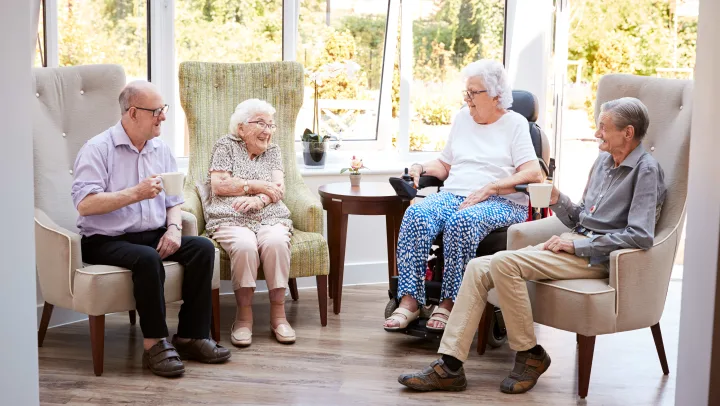Helped Living: a Compassionate Atmosphere for Seniors With Memory Challenges
By providing individualized treatment and structured regimens, these areas not only boost cognitive function however additionally foster emotional links, lowering isolation amongst residents. The efficiency of these treatments frequently pivots on the involvement of family members in the care procedure, motivating a closer evaluation of just how this collaborative effort affects end results for both locals and liked ones.
Recognizing Memory Challenges
Comprehending memory obstacles is essential for offering reliable like seniors dealing with cognitive decrease. Memory problems, which can show up as forgetfulness, confusion, or problem remembering current occasions, are often signs of conditions such as Alzheimer's illness or various other kinds of mental deterioration. These challenges can considerably affect an elderly's capacity to execute day-to-day jobs, maintain social relationships, and manage personal safety.
Acknowledging the different stages of cognitive decline is important for caretakers and medical care specialists. Early-stage amnesia might include light forgetfulness, while mid-stage decline can result in a lot more noticable disorientation and complication. In late-stage dementia, individuals may lose the ability to communicate effectively, requiring comprehensive support and understanding from caretakers.
Moreover, memory obstacles can stimulate a variety of psychological actions, including disappointment, stress and anxiety, and anxiety. This necessitates a compassionate approach to care that focuses on the psychological wellness of the individual. Understanding the intricacies of memory difficulties allows caregivers to develop customized methods that enhance interaction, advertise interaction, and offer a complacency. Eventually, a deep understanding of these difficulties is fundamental to supplying caring and effective treatment for senior citizens facing cognitive decrease.
Advantages of Assisted Living
Aided living deals many advantages for senior citizens with memory challenges, giving a helpful setting that promotes freedom while making sure safety and treatment. One of the main advantages is the day-and-night guidance and support readily available, which assists minimize risks connected with memory-related issues. Memory Care. This constant assistance enables elders to take part in everyday tasks without the fear of mishaps or complication
In addition, helped living centers frequently give organized regimens that can boost cognitive function and security. These routines assist homeowners feel more safe and secure and reduce stress and anxiety, as they recognize what to expect daily. Social interaction is an additional significant benefit, as these settings urge connections among citizens, advertising psychological well-being and decreasing sensations of seclusion.
Moreover, assisted living personnel are educated to identify the one-of-a-kind needs of seniors with memory difficulties, enabling for individualized treatment strategies that address individual preferences and demands. This tailored technique not just boosts the top quality of treatment yet also empowers seniors to maintain a sense of autonomy. Overall, assisted living functions as a caring service, balancing the requirement for support with the desire for self-reliance in the lives of senior citizens dealing with memory difficulties.
Specialized Care Approaches
Executing specialized care methods is important for efficiently supporting seniors with memory challenges. These personalized strategies concentrate on boosting the top quality of life and cultivating self-reliance while attending to the distinct needs of people with cognitive problems. One basic technique is person-centered care, which emphasizes the importance of recognizing each citizen's life background, preferences, and values. By customizing care plans accordingly, team can develop an extra engaging and meaningful setting.
An additional crucial approach entails using cognitive excitement therapies. Activities made to improve memory recall, motivate social communication, and advertise imagination can significantly affect residents' total well-being. Strategies such as reminiscence treatment leverage individual memories to spark discussion and connection, while songs therapy can evoke feelings and memories, offering convenience.

Creating a Helpful Area
(Dementia Care Charlotte)A supportive area plays an essential duty in enhancing the lives of senior citizens with memory challenges. Such a neighborhood cultivates an environment of understanding, empathy, and inspiration, which is important for people facing cognitive problems. By developing a network of support, assisted living centers can significantly improve the lifestyle for residents.
Central to a supportive neighborhood is the visibility of trained personnel that are delicate to the unique needs of senior citizens with memory problems. These professionals not only offer necessary treatment but likewise engage citizens in purposeful activities that stimulate cognitive function and promote social interaction. Programs that motivate engagement in team workouts, arts and crafts, or memory games can enhance both physical and mental wellness.
Furthermore, a helpful area advertises solid links amongst homeowners. Encouraging friendships and peer support helps to reduce feelings of isolation and fosters a sense of belonging. Regular get-togethers and communal dining experiences can further strengthen these bonds, creating an atmosphere where seniors feel valued and understood.
Involving Families in Care
Involving family members in the treatment procedure is vital for supplying detailed support to seniors with memory challenges. Member of the family usually work as crucial advocates, providing insights right into the person's preferences, history, and regimens that can boost individualized care. By including them in discussions and treatment preparation, helped living facilities can develop an extra alternative method that reverberates with the homeowner's requirements.

Urging families to take part in treatment not only boosts the well-being of the senior yet also supplies psychological support to member of the family. Involving households in treatment cultivates a sense of neighborhood and belonging, ensuring that senior citizens really feel attached to their loved ones. Eventually, a collaborative technique to care improves the lives of both residents and their households, producing a thoughtful and supportive environment that advertises self-respect and regard.
Conclusion
To conclude, helped living functions as a vital resource for seniors experiencing memory difficulties, using individualized treatment tailored to individual needs. The structured routines and appealing tasks advertise cognitive feature and psychological health, fostering a sense of belonging. Specialized care methods, such as reminiscence and music therapy, improve communication and Get the facts connection. By including households in the treatment process, helped living produces a detailed assistance network, eventually enhancing the lives of citizens and their enjoyed ones.